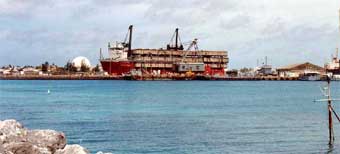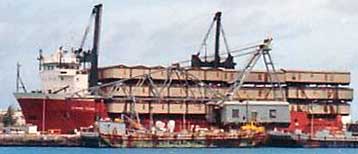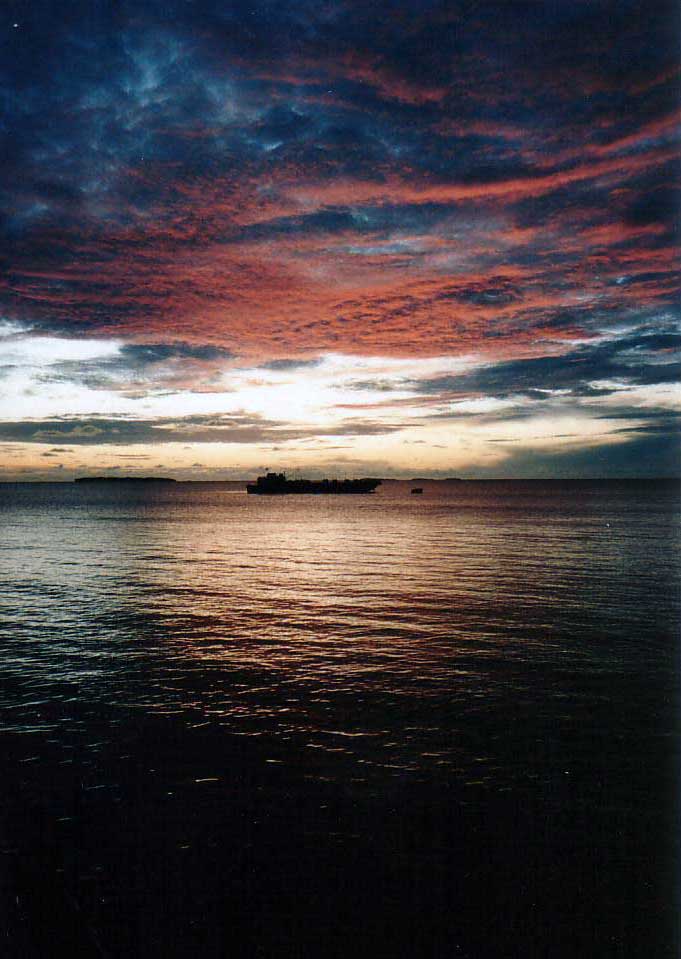|
Boating on Kwajalein’s
Beautiful Waters
In Memory of Tom
Overman (1967-1968, 1976-1995, 1998, 2000)
The clear, uncrowded
waters in and around the Kwajalein Atoll provided wonderful boating
experiences for many people who worked there. Some came to
Kwajalein as seasoned mariners while others had their first
experiences on the water there.
Many things regarding boating on Kwaj have changed since I first
stepped off a plane from Hickam AFB, HI in 1967. At that time,
according to my first SCUBA certification card, Kwaj was then called
Kwajalein Test Site (KTS). Over the years, this evolved through
Kwajalein Missile Range (KMR), United States Army Kwajalein Atoll (USAKA)
to Ronald Reagan Ballistic Missile Defense Test Site (RTS).
The Kwajalein Small Boat Marina’s Powerboats
In 1967, as now, if you didn’t have
your own private boat, you could sign one out at the Kwajalein Small
Boat Marina after you obtained the proper license(s). But in 1967, the
Marina provided FREE gasoline for ALL boats including the private
ones! I worked for GE’s Project GLOW on Kwajalein at the time. GE had
it’s own 20-foot powerboat with a single engine that the employees
used for water-skiing, fishing or diving in the lagoon. Then, as now,
for safety reasons, two engines were required to go ocean-side.
To sign out any of the Marina’s boats, you had to pass both written
and practical tests. Most people started out with single-engine Boston
Whaler C-boats for use inside authorized portions of the lagoon. The
next step up was to a twin-engine Boson Whaler B-boat. But you
couldn’t take it ocean-side until you practiced with someone who
already had an “ocean endorsement”. Once you had that stamped on your
license, you could take your B-boat out through South Pass or SAR Pass
to the ocean-side of the West Reef. Special weather conditions had to
exist to take a B-boat to the ocean-side of the East Reef through
Bigej Pass. That usually occurred during the calmer summer months.
Although there are no such craft at the Marina today, in 1967 you
could work your way up to an A-boat. These boats were about the same
size as a B-boat but they had a completely enclosed cabin. The cabin
was great in a driving rainstorm but the boats were quite top heavy
and rolled badly even in the lagoon. Marie, my wife-to-be, and I would
often motor over to Ennylabegan (Carlos) to see Dave Wirt and other TM
folks who lived on the island at that time.
In order to obtain a water-ski endorsement and use the Marina’s
specially rigged C-boat, you had to take a practical test with the
Marina Supervisor aboard. His task was to see how safely you retrieved
a downed skier and to make sure you didn’t approach the floating ski
platform so closely that your skier might accidentally crash into the
platform, often in an attempt to spray water on some hapless female
sitting there in her bikini! One high school student sustained
compound leg fractures in the 1980’s trying that stunt.
The Kwajalein Small Boat Marina’s Sailboats
There were classes held evenings by volunteers from the Kwajalein
Yacht Club (KYC) for those who wanted to learn how to sail. As with
powerboat endorsements, there were several options. Some started out
with getting a stamp of approval for one of a number of Sunfish
that had room aboard for one to two people. From there, you tried for
an OK to use one of the Marina’s Cal-20’s. In addition to learning
sailing terms like “hard ‘a lee!” you had to show your KYC examiner
that you could do the proper maneuvers necessary to retrieve a “man
overboard” within the required time without overrunning the luckless
floater. For some, the most difficult skill was learning how to
approach your designated Marina mooring buoy at the right speed. Since
the sailboats had no motors in the early days, it often happened that
beginners either never quite reached the buoy or flew by it so fast
that the person in the bow who was assigned to grab the buoy’s line
couldn’t hold onto it! For those who may remember names, Marina
Supervisor Larry Eskew endorsed all available power options for me in
the 60’s. In the 70’s, Russ Dempsy and Rudy Hergenrother signed off my
sailboat options.
In the 70’s and early 80’s, Special Services arranged for Cal-20 races
from Kwaj to Roi and back. Regretfully, the boats were getting old
and needed quite a bit of maintenance as became evident when the deck
of one of the boats peeled away from the hull in the vicinity of
Meck Island while running under full sail. The stanchions for the
mast’s rigging were secured to the deck, not the hull. The torque from
the mast on the deck began popping the deck-to-hull rivets like
falling dominoes! Fortunately, no one was injured. The Small Boat
Marina supervisor sent a B-boat up to tow it back.
The Army was considering retiring the Cal-20’s due to safety
considerations since the Rec Fund didn’t have enough money to buy new
ones. Ta-dah! Dr. Claggett Beck, a physician at the Kwaj Hospital,
came to the rescue! He organized a large number of volunteers to
re-hab the Cal-20 fleet. Global Associates provided the materials.
Over the months, new riggings for the masts were through bolted to
the hulls, sails were repaired, and fiberglass reinforcing was
applied. It lengthened the life of the boats by many years.
Marina Personnel
There were always many helpful folks at the Marina but I’ll never
forget my favorite Marina Supervisor: Hideo Milne! Hideo was the kind
of guy who seemed like he could always find time to help you with a
problem and do it with a sincere smile. He lived on Ebeye with his
gracious wife Lucy and owned his own Evinrude store that made getting
replacement parts much quicker than trying to obtain them
from Hono assuming your boat used Evinrude or Johnson outboard motors.
Marina mechanics like Bano, Rambo and others kept the
boats running despite the severe abuse unintentionally rendered by the
numerous novice boaters who were drawn to Kwajalein’s waters.
Larger Marine Vessels
In the 60’s and early 70’s fishermen and fisherwomen who didn’t own
their own boats and didn’t have Marina licenses to sign out
Marina’s boats had yet another option to satisfy their urge to hook a
big one. They were called J-Boats. These twin diesel-powered,
steel-hulled boats were about the size of some of the gunboats used by
the US military for patrols in Vietnam’s rivers. The J-boats
were workboats that were normally used to transport people and
equipment to islands within the Kwajalein Lagoon. One of them was
available every weekend for fishing expeditions. They were crewed by
Global Associates personnel who would show novices how to
use the fishing rods supplied by Special Services. People who wanted
to go on these trips signed up with their company and the
boats were assigned to different companies on a rotating basis. It was
great fun and no boats or gear to clean up afterwards!
|
However, the fumes from the diesel engines, especially while
running with the wind in large swells, prompted many people
to decline further outings on the J-boats! Marie and I vividly
remember an episode when visiting professors from the
University of Hawaii didn’t realize the consequences of throwing
up while on the windward side of the vessel!
Today, many people now use the swift, turbo-powered diesel
catamarans JERA and JELANG-K to travel back and forth to
Ebeye, Meck and occasionally Roi-Namur when the aircraft
are down.
Prior to the catamarans, there was a workhorse known as the
TARLANG. This gracious lady was a triple-engine WWII LST
that had been converted into a triple decked ferry whose primary
purpose was to carry people back and forth between Kwajalein and Ebeye |
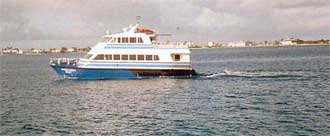
Jera, January 1989 |
|
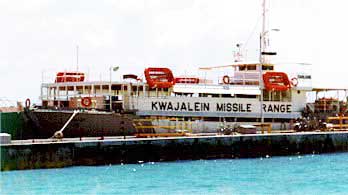
The Tarlang |
|
|
But often during the 70’s and 80’s, Special Services helped her more
high-spirited nature burst forth. Many folks will fondly remember the
moonlight
cruises aboard her and dancing on the top deck under the moon and stars
to the music of
Shermie Wiehe’s band as she leisurely meandered along
the inside of the East Reef between Kwajalein and Bigej Pass. As the
TARLANG approached the swells sweeping through Bigej Pass, dancing
on the top deck required increasing amounts of skill to counter the
roll,
pitch and yaw of the vessel! The cruises were always great fun!
Before she was sold, the Tarlang was also used to provide entertainment
for the students of Kwajalein Jr./Sr. High School. Marie, as the
Kwajalein
Schools Student Government Advisor, coordinated with the Army and
Marina to provide transportation for the annual Bigej trip. It was such
a
popular event that the sale of the Tarlang didn’t stop it.
|
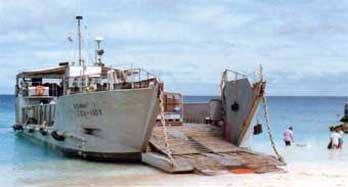
LCU - Bigej Trip - 1989 |
|
LCU’s were used afterwards.
As a boater, I was always fascinated by the skills demonstrated by the
tugboat and LCU captains as they maneuvered the monthly barges and
other large ships in against Echo Pier.
This boatload of trailers being
brought to Kwaj in May 1993 reminds me
of how unstable the operation appeared to non-experts like myself.
|
On 2/13/93, the 310-foot EAST WOOD was towed into Kwaj carrying Chinese
who were illegally bound for United States before
their engine died. The harbormaster had his hands full with the EAST
WOOD and the Coast Guard vessels in addition to all the
normal work traffic.
|
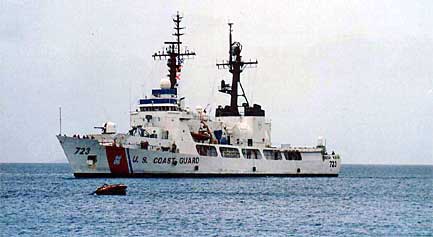
Coast Guard, 2-13-93 |
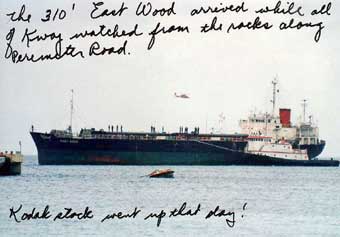
East Wood, 2-13-93 |
Some of the missions
involved large vessels such as U.S. Navy destroyers and COBRA JUDY down
to our own little submarine that
was used in the recovery of lagoon impact shots. Many of us wondered if
Kentron painted it yellow after hearing the Beatles’ song!
|
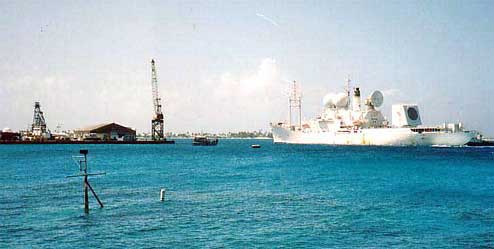
Cobra Judy - 1993 |
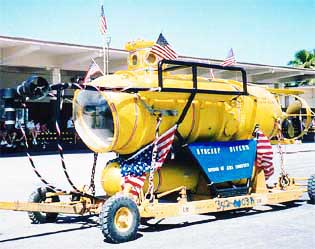
Yellow Sub - 1994 |
Private Boats and Their Owners
After spending over 20 years on Kwajalein, I have lots of fond memories of
various people and their boats. Unfortunately, I didn’t have a
camera with me most of the time to capture those great times. So, I hope
that those who don’t appear in text and/or photos here won’t
be offended. Maybe some of you will send Jody a picture in the future.
Perhaps some of these names and pictures will bring back
memories. I wish to express my appreciation to all those who did send me
some ‘tall tales’ that I have included in this article for Jody.
After using the Small Boat Marina’s C-boats, B-boats & Cal-20s for
several years, in 1980 Marie
and I decided to buy a sailboat. As a frequent visitor to the infamous
“Round House”, I had watched
Felix Cramer diligently restoring a Cheoy Lee 27 called the DRAGON LADY.
Felix had his own
sailboat, a Sea Tiger 41 that he had purchased in Taiwan. He, his wife
Pat, and his two sons sailed
it back to Kwaj and encountered some dangerous individuals doing so
while in Asian waters. Pat, a
ham radio operator, did the communications while aboard. Once back on
Kwaj, she continued being
of great assistance to Felix by bringing him his dinner at the Round
House every night so that he
wouldn’t have to stop working.
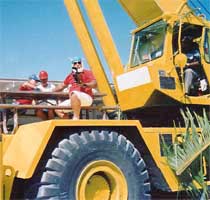
Bear Kapahu - 1994
|
Felix was a perfectionist when it came to boat work. With her
newly varnished mast and oiled teak deck, the DRAGON LADY
was beautiful. The one-cylinder Volvo-Penta diesel ran smoothly
even though it sounded similar to Bogart’s AFRICAN QUEEN.
Adrian Brown, Larry Homan and I became co-owners and with
the help of Bear Kapahu on the big crane, she was gently lifted
off Felix’s cradle and placed into the water. She was a great
boat and with a full keel, could point up high into the wind.
Unfortunately, with her narrow beam, she also heeled
precipitously in Kwaj’s windy season. So everyone got used
to riding on the high side to stay dry! |
|
|
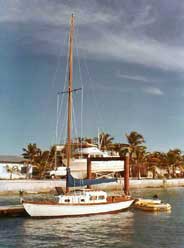
Dragon Lady - 1980 |
|
The first three-day weekend that followed the launching, Larry and I
obtained permission from the Army to
spend the first night on Omelek and the second night on Illiginni.
We caught six dogtooth tuna while crossing
Meck pass which meant we didn’t eat hamburger that night! Sleeping
space aboard at a premium so Larry
brought along a tent in order that he, his wife Carolyn, and their
two children, Nate and Jen, could sleep on dry
land. The tent was successful in keeping out coconut crabs and the
roaming rats, but not a millipede that may
have bitten him during the evening. Larry wasn’t feeling well the
next morning but we decided it was a beautiful
day for sailing and went to Illiginni.
By the next morning, Larry was running a high fever and we hoped for
a quick passage back to Kwaj so that he
could see someone at the hospital. What luck! The wind died and the
waters were like glass. We fired up the l
ittle diesel and motored all the way back at four knots. We later
found that Felix was correct, the Volvo-Penta
burned about only a pint an hour while running at four knots!
Within a year, Larry and I decided that owning a boat with a teak
deck and a wooden mast was just too much
work in the hot, tropical sun! We sold our two-thirds to Adrian.
Larry later brought the first Hobie 16 to the island and I decided a
powerboat would be better suited for our diving and fishing.
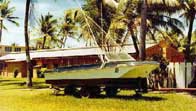
K-111 |
|
Our first powerboat was a partnership with Gene and Karen
Baumert. Karen had previously bought the boat with Ron Totman
and Tom ? as partners. It
was an old Boston Whaler type twin hull. They called it Oly
Gold. Its hull
was similar in design to one owned by Carl Sweetland and Ted
George,
which had an I/O drive. We bought out the other partners
when the
Baumerts went to Socorro, NM with Kentron on the GEODSS project
in
1983. The Totmans also left Kwaj shortly thereafter to go to
Maui on the
GEODSS too. |
|
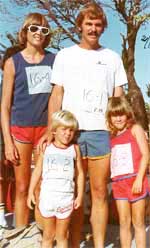
The Homans, 1979 |
|
|
Earlier (May 1981), Gene helped Bob Blair, Bob’s son Mike and Al
Whitcombe
sail Bob’s new 34-foot Ericson, the NEPENTHAE from Honolulu to Kwaj. It
took them 17 days. The only land they saw along the way was Johnston Is.
and Mejit Is. until they sighted the towers on Meck. They took a crash
course in celestial navigation before leaving Honolulu and made the trip
from sun shots using a sextant. To quote Gene, “I don’t think I would be
brave enough to do it again.”
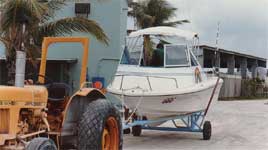
666 |
|
|
Not long after the Baumerts
and the Totmans left for GEODSS, we “upgraded” to a
20-foot model with Neal
McLemore as a partner. We
bought the boat from Kent
and Karen DeGroff. It had the
number 666 stenciled on the
bow and some advised us to
change it due to Biblical references.
|
|
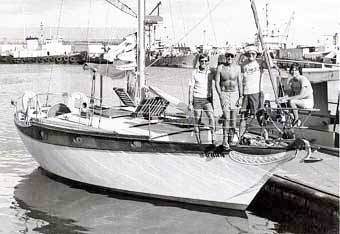
The Nepenthae |
|
But we had heard that it was bad luck to change a boat’s name so we
decided to live with the number too. Neal rebuilt one of the
engines
and we revamped the windshield to allow us to stand up while driving in
Kwaj’s occasionally choppy seas.
She was a good boat but was really designed more for water-skiing on
calm lakes with her low-raking bow. Coming through SAR pass
could be a harrowing experience as the bow dipped under the standing
waves and funneled huge quantities of water into the cockpit! |
Neal was a meticulous boat partner and we enjoyed the boat together. We
entered a Kwaj
fishing tournament and headed out with Neal, his son Collin, Lloyd Webb
and me in hopes
of at least not getting skunked. We headed out to deep water in hopes of
finding a school
of yellow fin tuna. With an hour left in the tournament and not a fish
in the boat, we decided
to make a high-speed run back to the west reef and maybe catch an ono.
No one was
looking aft when one of the reels began screaming! We looked around and
were shocked to
see a huge marlin dancing on it’s tail . We figured there was no way to
land something that
big in time to make the deadline but we tried anyway. Amazingly, after
less than 20 minutes,
it stopped struggling and we pulled it into the boat with the bill up
under the bow and the tail
hanging out between the twin Evinrudes. It must have died of a heart
attack to quit that
quickly. We made it back to the marina in time to have it weighed. Hideo
Milne got a forklift
to raise it out of the water to the scales and found that it weighed 408
pounds! It was enough
to win in that category. Talk about beginner’s luck!
Neal transferred with Kentron from Kwaj to Utah. That’s when we picked
up old friend,
Gordon Oyamot, as our next partner on boat 666. Like Neal, Gordon was
painstaking
about keeping the boat clean and running well. Whenever we went fishing
together, we
made sure to take Dale Pahulehua along as our “eyes”. The guy could spot
a flock of
birds feeding out over the ocean further than anyone I’ve ever seen.
In 1985, having the Kahunas on his side, Gordon said he would like to
rename the boat
WAINANI, “pretty waters" in Hawaiian in honor of his daughter Charmaine.
That was
OK with us. The picture, from left to right in the front row: Kimberly
Kowalkowski and
Charmaine Oyamot; back row from left to right: me, Dale Pahulehua,
Gordon’s
sister-in-law, Joanne, and Gordon. |
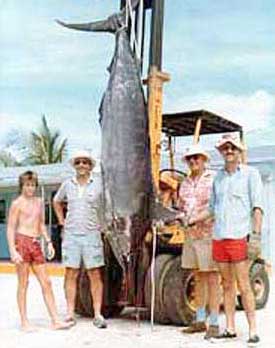
408 lb. Marlin, November 3, 1984 |
|
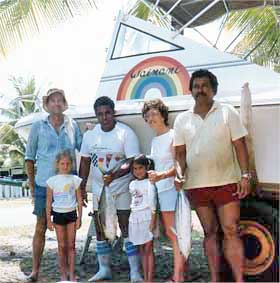
WAINANI, July 4, 1984 |
Two years later, we sold our half to Gordon and he took it to
Roi-Namur and built a very nice boat shack for it there. More on
Gordon’s present boat later. Hearing that Larry Campbell was
thinking of selling his Robalo 24, boat 204 named PISCES, I
asked him if he wanted to sell it. He purchased it new in 1981
from McWayne’s Marine in Honolulu. Larry eventually decided to
sell only half of it. My entry price was to purchase two new
Evinrude 90’s from Hideo Milne. We installed the engines and did
quite a bit of needed maintenance before she was put back in the
water.
Only weeks later, Larry collapsed and died from a heart attack
while washing the boat after a short fishing trip. That was in
the days when many people kept their boats next to their houses
or trailers.
Larry’s wife, Joan, and I were helping him at the time. The
ambulance was there within minutes and Dr. Lindborg worked
tenaciously trying to revive him in the hospital, but to no
avail. Larry’s passing was mourned by family and his many
friends on Kwajalein.
When Joan returned from Larry’s funeral in New Mexico, we bought
the remaining half of the boat prior to her departure from Kwaj.
Another boater friend from the Round House, Wally Derego, used a
large forklift to move the boat shed from the Campbell’s house
to my allotted space across from the Round House. |
|
|
We certainly used to see some
strange things being moved down the streets on Kwaj. Only on Kwaj would you
see a forklift moving a boat shed down the main street. The last Kentron
Site Manager, Herschell Atkinson, had a rebuilt Boston Whaler B-boat in
1980-81. On the way back from a fishing trip, the trailer’s axle broke right
in front of the reefer docks. A quick call to a friend in Global Associates
and soon the whole boat and trailer were being trundled down the road to the
Round House on the forks of a huge forklift for subsequent repairs.
I only wish I had taken a photo of people moving a large patio cover from
one house to another! Back in the days when people could sell their patios
and additions to other people, it was not uncommon to see 10 to 15 men each
holding onto a 4 x 4 post and slowly moving the entire patio down through
the housing area! Ah! Those were the days!
Anyway, back to boating! Taking a cue from Gordon Oyamot, we later
changed the name of our boat from PISCES to KUIIPO (“sweetheart” in
Hawaiian) in honor of my own sweet wife.
One of the first things that KUIIPO needed was a new
trailer. I sought the help of one of the nicest boatmen on the island,
Larry Kalawe. After I purchased all the HD galvanized pipe, Larry and I
went to the dump where he torched off the front axles and wheels from a
step van. With his extraordinary welding skills, he fabricated a
beautiful trailer for our boat. |
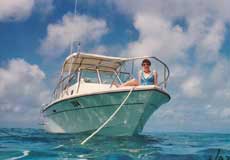
Boat 204, Kuiipo |

Larry Kalawe |
|
I put in a work order to the Round House’s famous boat builder, Floyd
Corder, to have the new trailer properly primed and painted.
Before Larry’s untimely death due to falling from the ALTAIR antenna
years later, he had a few boating problems of his own. Many of you may
remember the episode where Larry used the Marina tractor to back his
trailer down the ramp to retrieve his boat. With no one to help him, he
engaged the parking brake and left the diesel engine running as he
walked back down his trailer to grab the bow of his boat. Big mistake!
Never trust a parking brake! It slipped its catch and one can only
imagine Larry’s despair as the tractor quickly rolled down the ramp
until the engine decided it didn’t like salt water and exploded!
The repair bill wasn’t inconsequential. Shortly after that, the Marina
mandated that (1) blocks be placed behind the rear wheels and (2) the
engine be turned off when one got off the tractor.
|
| During the next
eight years, we put KUIIPO to good use on dives, fishing trips
and overnights. One of our favorite spots to anchor overnight
was the lagoon side of Onemak on the west reef. It was
best when the westerly winds were blowing since that made the
little natural harbor as smooth as glass. It was wonderful to
lie back on the bow after dark and look at the tremendous number
of stars visible since we were far from Kwaj or Roi lights. Even
though the sunset on the other side of the island, some of the
sunsets were spectacular. |
In 1995 we made the tough decision to
leave our island home and sold our beloved boat to Stan Jazwinski
and Bess Buchanan.
Many folks on Kwajalein deplored the fact that they couldn’t buy
freshly caught fish in Surfway even though the ocean around
Kwajalein had plenty if you knew how to catch them. Although Marie
and I often were lucky enough to catch dinner after going diving on
our boat, sometimes Ole King Neptune told the fish to stay clear of
our trolling lines. On such occasions, we’d turn to one of the best
fishermen on the island: Michael Maurer! Back in the 90’s, Mike
would sell you a whole yellow fin, ono, or other fish for only $1.50
per pound. If your filleting skills were poor, he'd sell you one
expertly filleted for the exorbitant price of $2.00 per pound!
That’s when guys were taking yellow fin to Hono at Christmas time
and selling it for $20.00+ per pound! |
|
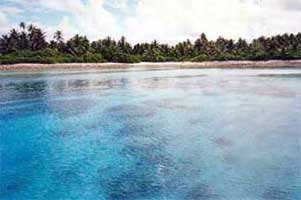
Onemak, November 1994 |
|
Mike and Jean Anne had a number of tours on Kwajalein, as an Army Officer in
1978 - 1981 and later as an employee of several different contractors.
Several tours means several boats. Their second one was called MISTY ANNE I
(number 224). One of the old Hourglasses shows Mike along with Ed Borgas and
Brent Ballard showing off their 357-pound marlin that they caught Ocean-side
of Gugeegue.
On one of Mike’s subsequent tours, he went with Larry Campbell and Russ
Holland for a fishing trip around the entire Kwajalein Atoll in Larry’s
PISCES! The trip took about a week. They went to Roi, spent the night,
refueled, put fish in the freezer at Roi, then went to Ebedon where Global
Associates was building the island’s first runway. They refueled again,
spent three more days fishing in the area before having the fish flown back
to Kwaj by chopper. They returned to Kwaj the next day. Talk about guys who
loved to fish!
Since Mike usually caught hundreds of pounds of fish, he later bought a
larger boat that became MISTY ANNE II. She is a Mark Line 3100 with an
overall length of 33 feet and now has twin Volvo gas 350 V8 I/O's. The
original owners were Ken Gilliam and two other people. They bought it in New
Zealand, named it KOAKIWI and had it shipped up to Kwaj in 1985. It went on
the rocks in Tropical Storm Roy in 1987. They decided it was not repairable
and sold all the equipment from the bow rail to the cleats on the stern to
the motors. In 1989 Mike bought the hull from Bob Gould and another guy who
had cut the flying bridge off to put on a boat on Ebeye. Mike fixed it up
with the help of his wife Jean and son Michael Jr. A subsequent storm put it
up on the rocks again, but once again, the Maurer team made all the
necessary repairs. I remember helping them one day in 1998 down at their
‘shed’ outside the Round House. Mike was spraying 2-part epoxy paint on the
hull and Jean had just finished painting the interior portion of the hull
with gray enamel. Even though she was wearing a ‘full painter’s suit’, she
had plenty of grey paint in her hair. She had a gallon of lacquer thinner in
her hand and was just ready to pour it all over her hair to get rid of the
paint (and hair too?). With all the smokers around the ‘shed’, she could
have become a human torch in seconds. I convinced her to let me use a rag
with a small amount of thinner to remove the paint!
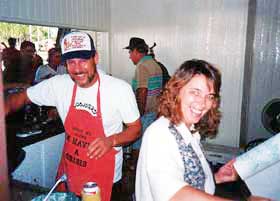
Mike & Jean Maurer cooking
their catch at Emon
Beach |
|
One of the ‘volunteer’ efforts that Mike and Jean participated in was
the occasional fish fry at Emon Beach pavilion number 1 when there were
visiting dignitaries on-island. They would get together with Chuck
Roberts who made the best tasting hushpuppies I’ve ever eaten, Ken
Jackson, and others and put on a feed that would shame most restaurants
in the CONUS.
Chuck Lesniak was another mariner whose boat suffered damage during one
of Kwaj’s tropical storms. The EAGLE was a large, beautiful boat that I
think was diesel powered. Chuck lost a portion of one of his fingers
during his attempt to keep her from going up on the marina’s seawall. |
|
|
Storms coming in from the West were always potentially hazardous for
boats on Kwaj. During the early morning hours on January 4th, 1979, Tropical
Storm Alice hit Kwaj. One of the Delong barges broke her moorings and
crashed into the rocks right in front of our trailer, T562. I called Harbor
Control about it but they said the conditions were too dangerous to try to
have men get lines on her from the tugboats. By dawn, the relentless waves
had used her as a battering ram to knock out a huge section of the rocks
before sinking her.
Strangely, Jim Denny was doing his usual morning show but didn’t mention
much about the storm’s damage except that we were going to have a lot of
rain that day! With the waves having already chewed up the dirt perimeter
road and undercutting the end of our trailer, I wasn’t getting anywhere with
Global Associates. Marie bravely road her bike down to Heavy Equipment and
told the Supervisor, Mr. Timas, that our trailer was going to slip into the
lagoon unless they did something. In no time, he had bulldozers pushing lots
of large rocks into the gaping hole in the seawall. It saved our trailer and
we eventually rebuilt our patio cover and used it until 1995 when we PCSed
and sold the patio and a 34-foot addition to Yvonne and Howard Duarte.
|
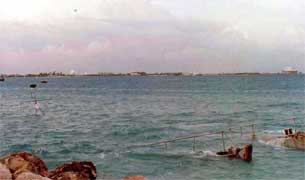
Delong Barge - Tropical Storm Alice,
1979 |
|
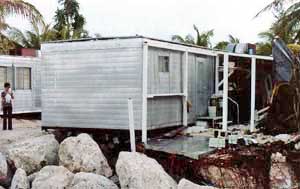
T562, Tropical Storm Alice - 1979 |
|
TS Alice also took a toll on private boats. Dr. Grant, DOE physician who
lived on Kwaj but worked on Ebeye, had a beautiful Morgan Out Island 36
sailboat. It sunk when its hull was cracked open after two floating
docks in the large marina squeezed it like a nutcracker! Felix Cramer
bought it, rebuilt it and then sold it to Jim Crouch who worked at MMW
and later KMCC. Jim eventually sold WINDWALKER in 1993, bought a Lafitte
44 a year later and sailed it from Honolulu to Kwaj in 17.5 days.
On January 10th, 1988, Tropical Storm Roy damaged more boats on Kwaj.
Three years later, Typhoon Zelda flattened the cover on the boat next to
ours but luckily did no damage to ours. |
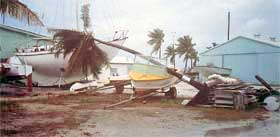
Tropical Storm Roy - 1988 |
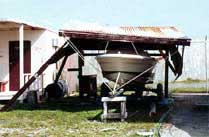
Tropical Storm Zelda - 1991 |
|
|
Another person who sailed his boat to Kwaj is Nate Jackson. I don’t have the
details about it other than once he got it to Kwaj, he put it up on a cradle
and began redoing the cabin’s woodwork in the same masterful style Nate has
always done with his other tasks.
Eck Natter and wife Vera Fisher had their boat sailed out to Kwaj, used it
for a year or two, hauled it out for maintenance and never got it back in
the water.
While a number of people sailed their boats TO Kwaj, some also sailed theirs
FROM Kwaj. Steve and Betty Hill worked on a sailboat in the Round House for
about six years before sailing it down into the South Pacific. I heard that
they were held up by pirates and eventually sold the boat in Australia or
New Zealand.
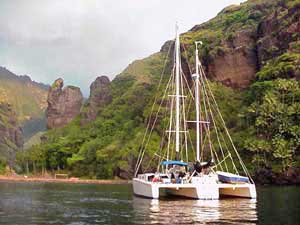
Cherokee, Marquesas, Fatu Hiva, Hanavave, Bay of Virgins |
|
The largest sailboat I can remember was co-owned by Paul McGrew, Tom
Cardillo and Johnnie Breen in the late 90’s. The trimaran was sailed from
Hono with delivery on Kwaj. The boat had been in Majuro several years
before. It was 47 feet long and it took the three of them a year and
half to refurbish it. Once finished with the rehab, they traveled south
through Fiji and spent six months in New Zealand. From there, it was on
to Tahiti, the Marquesas, then to Honolulu to sell the boat.
Paul’s father, Carl McGrew, sent me this picture of some sailboats that were
being used in the Marshall Island prior to WWI. It may have been taken on
Likieup but he wasn’t sure |

Marshall Isles Proas |
|
|
Carl McGrew and Jerry Shafer bought a 21-foot Boston Whaler, Number 779, in
Santa Cruz, CA and had it shipped to Ebeye. Carl and Claudine accomplished a
lot of diving and fishing before selling it when they PCSed. I think it was
in 1991 that Marie and I decided to spend a weekend on Roi-Namur with the
two of them. I worked on Roi and didn’t take the plane back after work on
Friday. Marie flew up to meet me and then the two of us joined Carl and
Claudine when they arrived at Yokohama Pier later that day. We went diving
and fishing the next day and motored back to Kwaj on Sunday. Oh! My aching
back! Not having a deep-V hull, Boston Whaler B-boats aren’t exactly gentle
on the human spine in rough waters! |
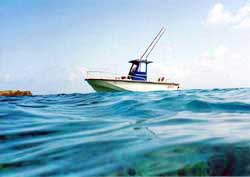
McGrew's Boat 779, 1992 |
|
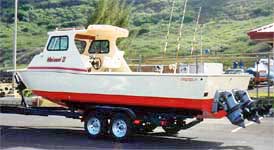
WAINANI II |
|
Hawaiian boat builders know about rough waters. So, after selling WAINANI,
Gordon Oyamot decided his next boat should come from Hawaii. Fortunately, he
has a cousin on Kauai who was happy to oversee the production of the boat.
The WAINANI II arrived on Kwaj on January 7th, 1999 via a Matson container.
It was missing its four counter-rotating props but Matson replaced them
without cost. She’s a 25-foot Radon with twin 4-cylinder turbo-charged Volvo
I/O diesel engines. With 130 HP each, the boat can hit 40 to 45 MPH.
Coupling two 100-gallon tanks of diesel with the fuel economy of diesel
engines means that at three gallons per hour (2700 RPM), she’s got a range
of about 1500 miles. Gordon has made trips through out the atoll and after
overnight at Roi, he's gone to Ebadon up in the NW corner of the atoll, not
to mention trips to Lib Island and Namu Atoll. That’s a lot of fishing,
Gordon!
|
They had the boat formally blessed before the cousins took it for its maiden
voyage in Hawaiian waters. Later, Father Bill Sullivan blessed it on Kwaj
prior to its first launch Perhaps that’s why the crew has never once been
"skunked" on any trip!
People who have been on Kwaj since Gordon and his friends built his boat
“shack” down near the Round House know what I mean when I say it’s better
than some of the BQs used on Kwaj in the “old days”! I won’t go into all the
details; suffice to say it is a great place to spend an evening with friends
after a long day fishing.
While there have been a lot of boaters who have made lengthy trips in larger
boats, you have to admire people like Jerry Cross, Mike Baker and Keith
Perkins for their “intestinal fortitude” in making their trips with WILY!
Jerry and Mike purchased what was to become WILY on a bid from the marina in
1977. When Mike and Jenny Baker PCS'ed, Keith Perkins became a co-owner.
Wily was a Boston Whaler C-boat and was missing her left bow after a
collision with a water taxi.
Clever teachers that they were, Jerry and Mike got a fiberglass impression
from another C-boat at the marina and made a new bow for WILY. They painted
Coast Guard stripes on the bow and a silhouette of a coyote on the center
console. Two 35 HP engines were placed on the boat and they were ready to
fish! Jerry said that he was told by some of his high school students that a
C-boat would handle most of the waves ocean-side so he decided a 16-foot
boat would do just fine! Hummm! Placing one’s life in danger based on
the experiences of high school students shows the faith he had in his
students! To quote Jerry, “I admit it got a little rough a few times
while fishing ocean-side, off the golf course at the end of the island. But
if there were birds and fish, we tried to ‘be there’". |
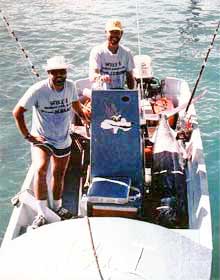
WILY |
|
He also said, “We only were in trouble one time. It happened during a
weekend ‘camp out’ on Illigini Island. We arrived off the island on a Friday
evening and decided to do a little fishing before going in to stay the night
in a trailer on the island. A storm came up with high winds and caught us
about three miles off the reef. With the storm blowing from the reef, the
waves were so high that we couldn't head into the wind without filling the
boat with water. Several times, we had so much water in the boat that the
gas tanks were floating. When the boat would fill with water we had to turn
between the big waves and go with the wind and waves in order to let the
water drain out of the boat. During this process we weren't gaining much
headway toward the safety of the reef and islands. This is the only
time I remember donning our life jackets during the years we had WILY.
Needless to say, we made shore after dark, wet to the skin, lots wiser and
very happy to be alive.”
I made only one fishing trip to Lib Island (approximately 50 miles) and that
was with Neal & Nancy McLemore and Marie aboard boat 666. Jerry said he made
several trips to Lib Island in WILY. While Neal, Nancy, Marie and I wanted
to be back on Kwaj before dark, Jerry and his crew did just the opposite. He
said it was always easier to spot Kwaj by the beacon from the water tower
while traveling after dark! Ahh! The faith in the wonderful people down at
the power plants!
Here’s one last tale in Jerry’s own words. “We were off the shores of
Illigini Island. Jim Brown, a helicopter pilot, happened to mention that
there was a large school of tuna in that area so Mike Baker and I checked it
out the following Saturday. Sure enough, when we arrived, large yellow fin
tuna were leaping out of the water in pursuit of baitfish. We tried and
tried to catch these fish without success. Finally, Mike said, ‘We
tried everything else, let’s go really fast!’ We were at water ski speed
when we caught our first 90-pound tuna! After learning the trick, we
started dragging them in one after another. In fact, we caught so many of
them that we were up to our knees in fish. Jim flew over in his helicopter
and took a look with his passengers and we could see the excitement in their
faces. WILY came back to port with a boat load of fish that night.”
Of course, if one wanted to go power boating in something smaller than a
Boston Whaler C-boat, one only has to remember Chuck Gruebner and his
jet-ski! He had one of the first ones on-island although he says that his
was preceded by one owned by a bachelor as well as two that were brought in
by a Lockheed couple, Mark & Eleanor Fabyonic.
Chuck built a ‘ski-shack’ that had one side wall hinged to serve as a ramp
when lowered. It eventually ended up in the small area between the small
boat marina and the boat ramp across from the carpenter shop. It was the
only shack in the area that had electricity, running water and telephone
service. In Chuck’s words, “The location was perfect … it still brings a
smile to think back to the weekend late afternoons sitting on the shack's
deck, grilling burgers and watching the returning fishermen (some of whom
were pretty well gassed) demonstrating their tractor, trailer and boat
loading skills.”
Jim Estes bought a jet-ski at the same time as Chuck. Chuck said, “Jim lost
interest fairly quickly and sold his ski to a bachelor who used it as a
personal Ebeye water taxi. The guy did zip maintenance and the motor soon
went south. I bought it (cheap), rebuilt the motor and sold half interest to
the aforementioned Mark Fabyonic. Mark's original ski was a stand-up model
where mine were sit-downs. Mark and I spent many of our Lockheed Fridays off
lagoon cruising on the sit-downs. When Mark was PCSing, we ran a raffle for
our shared ski. Tickets were $100 each (six for $500) and we had a max of 40
tickets for sale. The drawing (numbered white poker chips in a Crown Royal
bag) was at the shack with Nancy Opiniano (then Patton) doing the honors.
And the winner was … Matt Brown! He and friends used the hell out of the ski
for that summer and Matt sold it for, I believe, $1200 before leaving for
school. Not bad for a $100 "investment" that dad, Terry, had gone somewhat
ballistic over!”
In subsequent years, Jim Estes bought several larger boats but I don’t have
any information or pictures of them.
A pram is a very small sailboat that is used in some areas of the world.
About the only time I saw a pram with three people in on Kwaj was at the
Swashbuckler’s ball on March 7th, 1988 with Dr. John Leeper, his wife, Laura
and John’s brother aboard!
Going smaller in the sailing category would inevitably take you windsurfing.
There were many excellent windsurfers on Kwaj in later years. During the
strong winter trade winds, I can remember seeing them flying along the edge
of the reef between Little Bustard Island and the north end of Kwaj. They
even put in some mooring buoy lines and cemented in some steps to ease their
entry into the water at that end of Kwaj.
There were so many, many more great boaters and great boating stories on
Kwaj. I’ll just run a few names by you to see if they bring back some
memories: Engel English, Eric Stevens (bought two boats from the Navy at
auction in Hono, sold one, shipped the other to Kwaj but never finished
working on it before he PCSed in 2000), Glenn Gandara, Hal & Vi Cunningham,
Jerry Brewer, Jerry Cornell (never finished his boat), Jimmy Friel, John
Fratangelo, Kai Kalahiki, Lou Stegmann, Orlando Paulo, Paul Thomas, and
Terry Brown. |
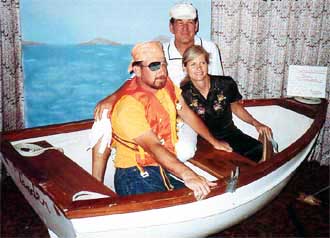
Leeper's Boat, 3-7-88 |
|
There are stories about the 4-wheel drive diesel Dodge trucks that we got
from the Army after Operation Desert Storm. They were great to use in
conjunction with the tractors that the Kwaj Power Boat Club obtained from
the Army at no cost with the understanding that we assumed the cost of
maintaining them.
I’m sure that those of you who spent time on Kwaj will agree with me when I
say that Kwaj was, and probably still is, a very unique place to live and
work. Things went on there that just couldn’t happen in towns and cities
back here in CONUS. For me, the work was exciting, the recreation was
fantastic and the friends we had were beyond compare. I hope that this
reminiscing has brought back some of those wonderful days for you too.
As our Marshallese friends say, Yokwe Yuk!
|



